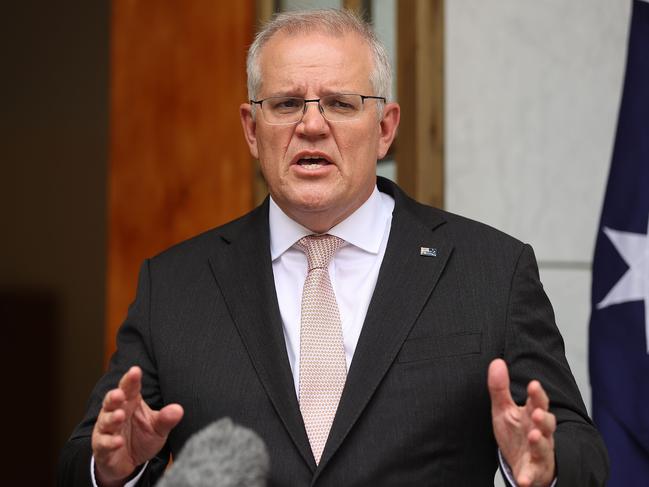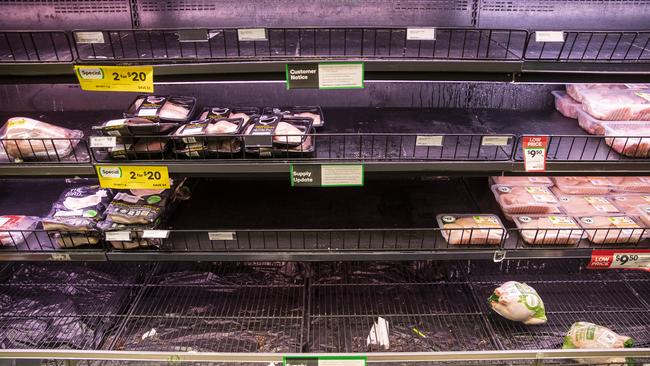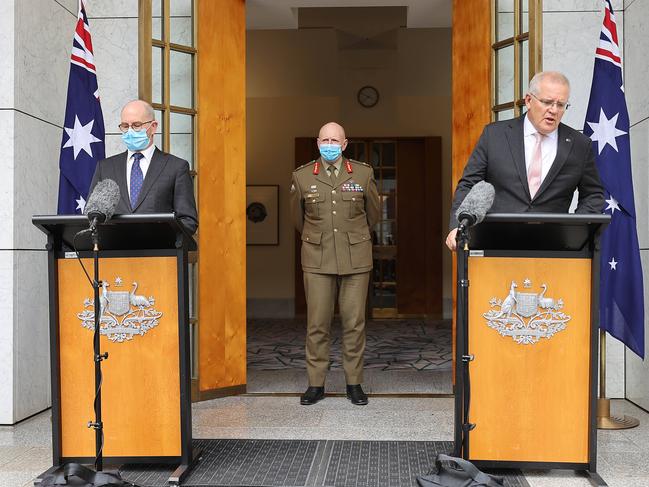Scott Morrison updates nation on Covid-19 close contact changes for essential workers
Scott Morrison has blasted those who think they can get Covid and get over it by going to a party, as he revealed changes to Covid-19 rules for essential workers.
Coronavirus
Don't miss out on the headlines from Coronavirus. Followed categories will be added to My News.
Scott Morrison has blasted those who think they can get Covid and get over it by going to a party, as he revealed changes to Covid-19 rules for essential workers.
The Prime Minister said the definition of close contact has been eased to ensure more workers can get back to their day jobs.
“To further ease the pressure on supply chains, we extended the easing of restrictions for close contacts,” he said.
“That is the one which enable someone who may be a close contact and get a negative rapid antigen test ... they can go straight back to work. The most immediate extension to that is to all transport, freight and logistics employees.
“Not just those directly involved in food distribution, all in the transport, freight and logistics centre. That will include those who work at service stations,” he said.
“We will also be extending it to if it hasn’t already been done, in many cases it has, it will cover all healthcare and support.
“Emergency services, including law enforcement, correctional services, energy resources and water, waste management. Food, beverage and other critical good supplies.
“The food distribution system and production system, I am not talking about hospitality, but telecommunications, data, broadcasting and media. It will also extend to education and childcare.”
Mr Morrison revealed Australia could soon have one in ten workers off sick.
“We heard today from a Treasury Secretary that we could be looking at and up to 10 per cent absenteeism from our workforce, at any one time at its peak,” he said.
He said restrictions could not have been loosened in the critical workforce until now because the severity of the Omicron strain was not known.
“Once we became aware that the severity was less, that has enabled us to move that we can relax some restrictions in critical workforces,” he said.

“So this is a constant daily process of balancing the need to keep people at work and to protect our hospitals. And that is why (the advice) changes almost daily.”
Mr Morrison said the objective in this phase of the pandemic was to minimise serious illness, hospitalisations and fatalities and to maintain restrictions to support that goal.
He said preventing everyone in Australia getting the virus was “not the objective...this is not a realistic objective and it’s not practical”.
“What we’re trying to achieve is to ensure that we can keep hospitals under the least pressure they can possibly be put on them,” he said.
“That we can maintain the strength of other hospitals do this pandemic and recognise that, of course, our hospitals and health systems are under significant strain at the present. That is unavoidable.”
The workforce changes discussed at national cabinet was a “critical discussion”, he told reporters in Canberra. He described changes being made as part of a “constantly moving target”.

He said closing schools would just add to absenteeism.
“If schools don’t open, that can add an additional five per cent of the absenteeism in the work force,” he said.
“It is absolutely essential for schools to go back safely and remain safely open if we are not going to see any further exacerbation of the workforce challenges we are currently facing.
“All is open means shops open. Schools open means hospitals are open. It means aged care facilities are open. It means essential services, groceries are on the shelves.”
Mr Morrison said he did not want any child turned away at a childcare centre.
“Responses must be proportionate and health risk based, childcare services and schools are equipped to respond on the basis of public health advice, and support from public health authorities were required and well being of children and education staff to be supported,” he said, noting South Australia and Queensland had delayed the start of the school year, but wanted no child of essential workers “ turned away”.
“Supporting essential workers and education and childcare will be important and the Commonwealth and states are working together to have 50-50 funding arrangements in place to ensure that is put in place by the time school comes back and we will have more to
say about that next week,” he said.
Mr Morrison had tasked the First Secretaries Group to develop a national framework to enable students to return to school on day one of term one.
He wanted consistent rules across all jurisdictions and for schools to “go back and stay back”.

After last week’s national cabinet, Mr Morrison said the group’s report would include “everything from the testing arrangements that have been put in place, any furloughing issues that need to arise, matters relating to workplace health and safety, matters relating to rates of vaccination and a series of other issues”.
But Queensland has already told students they won’t return to the classroom until February 7, two weeks later than originally planned.
From January 24, students in years 11 and 12 will return to remote learning.
The decision came after modelling showed the Omicron wave would peak in Queensland in the last week of January and first week of February, with authorities loath to send unvaccinated children back to school while that was happening.
NSW is sticking to the scheduled start on January 28, as is Victoria, despite troubling Omicron waves in both states. The ACT will follow suit.
Tasmania plans for a February 9 return, the Northern Territory is scheduled to return on February 1 and WA is also looking to start on January 31.
South Australia also is scheduled to start the term on January 31, but the government is under pressure from teachers to match Queensland’s delay.
The SA state government is likely to make its decision on the start day on Friday, after the national cabinet meeting.
A key factor in the return to school – vaccinations for children – could also come up in cabinet.




